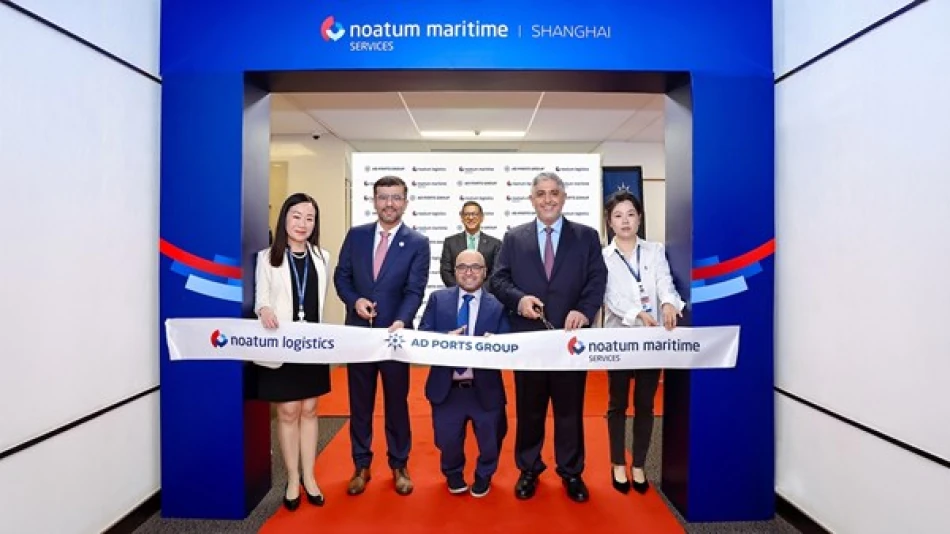
China Debut: Leading Naval Tech Firm 'Navatom' Opens First Shanghai Office
Abu Dhabi Ports Expands Maritime Empire with Strategic Shanghai Office Opening
Abu Dhabi Ports Group has officially opened its first Shanghai office through subsidiary Navatum Marine, marking a calculated expansion into China's dominant shipping hub. The move positions the UAE maritime giant to capitalize on Shanghai's role as the world's busiest container port while strengthening Gulf-China trade corridors that have become increasingly vital to global supply chains.
Strategic Positioning in Global Trade's Epicenter
The new Shanghai office, operated by Navatum Marine Services, represents more than geographic expansion—it's a recognition of shifting trade dynamics. Shanghai handles over 47 million TEUs annually, making it the world's largest container port by volume. By establishing a physical presence there, Abu Dhabi Ports gains direct access to Chinese shipowners, charterers, and logistics operators who control significant portions of Asia-Europe and Asia-Middle East trade routes.
Captain Ammar Mubarak Al Shaiba, CEO of Maritime and Shipping Sector at Abu Dhabi Ports Group, emphasized the office's role in providing "close collaboration with ship lessees and owners in the region." This proximity strategy mirrors successful approaches by Singapore's PSA International and Denmark's Maersk, both of which have built global networks through strategic local presence.
UAE's Maritime Ambitions Meet China's Belt and Road
The timing aligns with broader UAE-China economic integration. Trade between the two nations exceeded $70 billion in 2023, with the UAE serving as China's largest trading partner in the Arab world. Abu Dhabi's Khalifa Port has emerged as a key transshipment hub for Chinese goods destined for Africa and Europe, while Chinese state-owned COSCO operates significant capacity at the facility.
This expansion also supports China's Belt and Road Initiative, where UAE ports serve as critical nodes connecting Asian manufacturing with Middle Eastern and African markets. The Shanghai office enables Abu Dhabi Ports to better coordinate with Chinese logistics giants and state-owned enterprises that drive much of this trade flow.
Market Implications and Competitive Dynamics
For maritime investors, Abu Dhabi Ports' Shanghai presence signals confidence in long-term Asia-Middle East trade growth despite recent supply chain disruptions. The company's parent, ADQ sovereign wealth fund, has been aggressively expanding the ports business as part of Abu Dhabi's economic diversification strategy.
The move also intensifies competition with regional rivals. Saudi Arabia's PIF-backed Red Sea Gateway Terminal and Qatar's QTerminals have similarly expanded internationally, creating a Gulf ports arms race for global market share. Shanghai's selection over other Chinese cities like Shenzhen or Ningbo suggests Abu Dhabi Ports prioritizes financial services integration alongside logistics operations.
Operational Advantages and Future Outlook
The Shanghai office provides Abu Dhabi Ports with real-time market intelligence and relationship management capabilities that remote operations cannot match. Chinese shipping decisions often rely heavily on personal relationships and local market knowledge—factors that favor companies with boots on the ground.
This expansion likely precedes additional Asian offices, with Hong Kong, Singapore, and Mumbai representing logical next steps. The strategy reflects broader Middle Eastern recognition that future growth depends on deeper integration with Asian supply chains rather than traditional Europe-focused trade patterns.
The Shanghai office opening represents Abu Dhabi's calculated bet that China-Gulf trade corridors will continue expanding despite geopolitical tensions, positioning the emirate as an indispensable link in evolving global logistics networks.
Most Viewed News

 Layla Al Mansoori
Layla Al Mansoori






